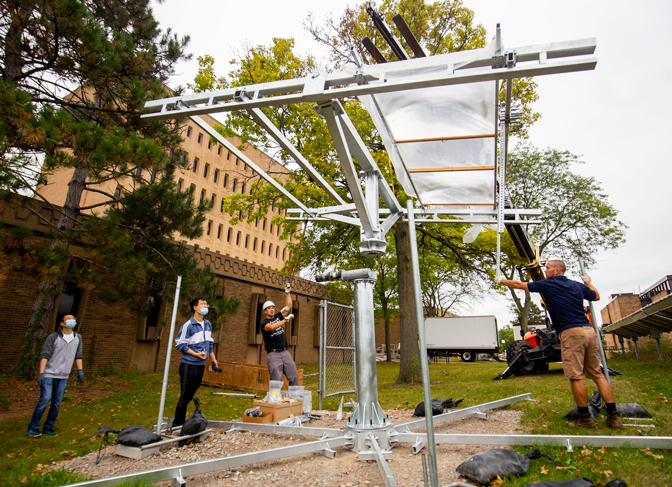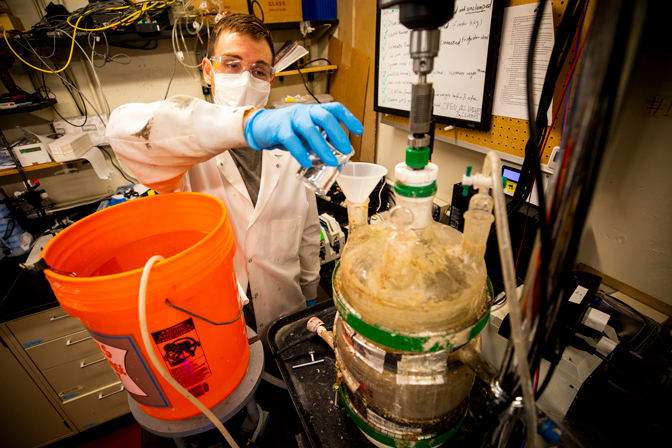
Equity in the energy technology transition is new Institute’s goal
The Institute for Energy Solutions will continue U-M’s 75-year legacy of leadership in energy research.

The Institute for Energy Solutions will continue U-M’s 75-year legacy of leadership in energy research.
As the world faces a global energy crisis and a changing climate, the University of Michigan is launching a new Institute for Energy Solutions that aims to accelerate an equitable transition to a more sustainable energy future.
Founded with $2.1 million in seed funding over three years from Michigan Engineering and the U-M Office of the Vice President for Research, Energy Solutions builds on U-M’s 75-year legacy of leadership in energy research as well as its broad expertise—not only in energy science and technology, but also in the social, environmental, and economic interconnections that are crucial to enabling a just transition.

“Today as a species we face the monumental tasks of course correcting global carbon emissions and reimagining the energy systems that drive modern society,” said Margaret Wooldridge, director of the new Institute and the Walter J. Weber Jr. Professor of Sustainable Energy, Environmental and Earth Systems Engineering and an Arthur F. Thurnau Professor in the departments of Mechanical Engineering and Aerospace Engineering.
“Science and technology have central roles to play, but we need to make sure we develop and deploy them in ways that benefit everyone—particularly those who have been historically underserved.”
The Institute will focus on research, outreach, community engagement, and education as well as support U-M’s carbon neutrality goals. Among its first programs will be a fellowship program for graduate students and post-doctoral scholars that includes interdisciplinary training. The Institute will also strive to further enable U-M as a living laboratory to demonstrate new low-carbon technologies and systems.

The Institute’s initial goal is to build community and make connections across the university and beyond, prioritizing topics that offer broad benefits. That could include building robust energy-equity metrics, developing methods to incorporate voices from underserved communities in the creation of energy systems and technologies, and advancing distributed energy at scale to address rural and urban needs.
“Energy Solutions truly puts our People-first Engineering framework into action, bringing together the engineering fundamentals, convergence of disciplines and an equity-centered, global worldview to close critical gaps in society. Today’s challenges demand this kind of holistic approach,” said Alec D. Gallimore, the Robert J. Vlasic Dean of Engineering, the Richard F. and Eleanor A. Towner Professor of Engineering, an Arthur F. Thurnau Professor, and a professor of aerospace engineering.

U-M’s energy leadership began in 1948, when the Michigan Memorial Phoenix Project was established to honor members of the university community who died in WWII and explore the peaceful applications of nuclear science and technology. U-M housed a research nuclear reactor from 1956 to 2003 and the U-M Energy Institute from 2006-2021.
“For decades, the University of Michigan has played a critical role in developing and integrating science, technology and policy solutions to address the world’s most pressing energy challenges,” said Rebecca Cunningham, vice president for research.
“This new institute will allow us to expand and strengthen research collaborations in this important space so that, together, we can help create an energy future that is clean, secure, equitable and affordable for everyone.”
The Institute for Energy Solutions will partner with strong existing programs and resources including at Michigan Engineering, the School for Environment and Sustainability and the Graham Sustainability Institute. In August, U-M was selected to lead an $11 million Department of Energy Center to enable development of advanced batteries and fuel cells for electric vehicles.